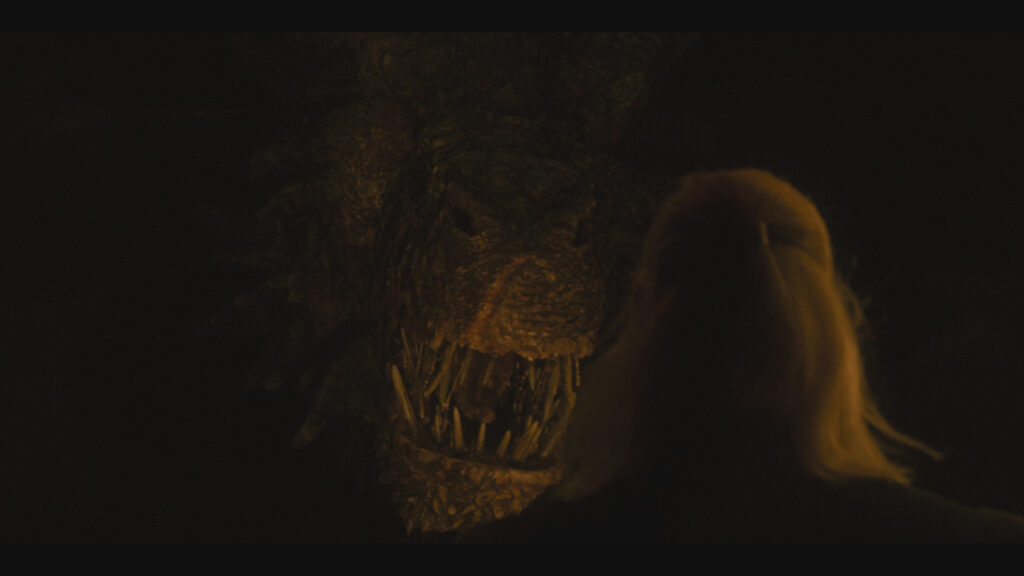House of the Dragon delivers a gripping finale that brings its first season full circle.
Written by Ian Thomas Malone, Posted in Blog, Game of Thrones, Pop Culture, TV Reviews
House of the Dragon headed into its first finale with one simple mandate. All the chaotic time-jumps and recastings that threw ample hurdles at an audience just trying to learn its characters’ names served the singular purpose of getting all the pieces in place for the main event, the last dance, to borrow a phrase from Michael Jordan’s documentary that saved America from boredom in the early days of Covid. Episode ten, appropriately titled “The Black Queen,” had to deliver a suitable rationale for letting a family squabble devolve into a realm-shattering war.
The absence of the Dragonstone crew from the previous episode embodied a broader problem for the show’s back half. Rhaenyra functioned early on as the closest thing to a definitive lead for House of the Dragon, lacking a clear counterpart like the dynamic between Jon Snow and Daenerys Targaryen in Game of Thrones, the ice and fire. House of the Dragon had to clear over a decade of backstory before it could introduce characters like Aegon and Aemond, vital figures for the rest of the events of the series. “The Black Queen” gave the show a chance to come full circle, resolidifying Rhaenyra as the emotional core of the series.
Emma D’Arcy showed off their range repeatedly throughout the episode, Rhaenyra contending with the deaths of her father, stillborn daughter, and second son all while preparing for war in the infancy of her reign. Rhaenyra’s coronation was easily the most moving scene of the season. The acting, score, and cinematography demonstrated the Westerosi sense of awe and wonder at its best, a high point for the entire franchise. Matt Smith beautifully captured the reverence that Daemon holds for his wife, even as he bristles with restraints on his appetite for control.
The episode did highlight the show’s broader disconnect toward how its own characters might be received over the course of its sprawling, chaotic season. The defection of Kingsguard member Ser Erryk Cargyll delivered an emotional moment when he revealed the crown he spent much of the previous episode acquiring, putting himself in opposition to his brother Arryk. There’s easy sympathy to be had in the idea of twin brothers going to war against each other, but Erryk and Arryk have received such little screen time that it’s hard to care much about them as characters.
A similar predicament befalls the scene between Corys Velaryon and Rhaenys Targaryen, the former lamenting the current state of his family. House Velaryon has had a mess of a season, with plotlines such as Corys’ effort to marry his prepubescent daughter to an old man, the marriage of his closeted homosexual son to Rhaenyra, and the execution of his younger brother for stating the blatantly obvious reality that his grandchildren from that marriage did not possess an ounce of Velaryon blood. It’s hard to take House Velaryon seriously when the show remains so hellbent on making them the patsy for every storied Westerosi pastime such as incest and adultery.
Anyone who’s read the novellas that make up Fire and Blood would be excited for Lucerys’ ill-advised trip to Storm’s End, a plan so stupid that House of the Dragon wisely chose not to spend much time explaining it. After an extended sequence where Daemon hurled excessive amounts of exposition into Westerosi geography, the show wisely didn’t try to explain Rhaenyra’s senseless decision to send her young children as envoys to anyone other than reliable allies. Lucerys did not really travel to earn the support of House Baratheon, but to get killed by his uncle, giving his mother a worthy excuse to go to war against the Green’s.
Lucerys didn’t make much of an impression in his limited screen time, but Ewan Mitchell seized every opportunity to endear Aemond to the audience. The beautiful sequence of the behemoth Vhagar chasing down the much smaller Arrax represented some of the best special effects we’ve seen from either House of the Dragon or its predecessor. The audience doesn’t need to care that a young boy was senselessly murdered, not when his uncle is the far more compelling character.
House of the Dragon concludes its first season on an extremely high note. It is more than fair to acknowledge the reality that this season would have worked better with two or three additional episodes given the amount of ground it covered. Ten episodes is an arbitrary number, and the cost is hardly a concern for a flagship HBO offering.
The highs of “The Black Queen” ultimately demonstrate House of the Dragon’s ability to stick the landing. Things may have been rushed, but the show delivered in its efforts to set the stage for the dance. Time will provide a better rubric to evaluate the pacing issues throughout the season, but the show did a fantastic job establishing the stakes of its premise.












2 Comments